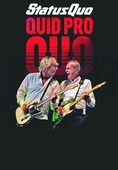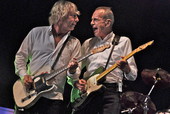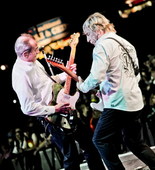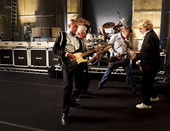Status Quo
I Have Eight Children, and They All Vary
01.08.2011
Архив интервью | Русская версияThat was an offer we could not refuse. Growing up as kids in the 80s and seeing the “In The Army Now” video on TV all the time, then catching the band live at one of our lives’ most memorable gigs at Moscow’s Dynamo stadium in 1996, and now being offered a chance to do a phoner interview with Status Quo mainman Francis Rossi – who would even try to say no? The recent Status Quo albums may not have been their most successful ones, but Francis’ solo release “One Step At A Time” (2010) was highly acclaimed, and the band’s newest record, “Quid Pro Quo” also has good chances to receive a warm welcome by the fans and critics alike. Read on to learn what Francis thinks about the latest record, the band’s relentless live activities, military service and his children’s musical endeavors…
A couple of years ago Status Quo performed in Russia after a really long break. In a recent interview with a magazine from Russia you were asked about your impressions from that trip, and you said that you didn’t like the Moscow venue at all. What was wrong with it?
No, I didn’t like the Moscow venue. We intended to be in more of a conventional hall, I think, so that the fans could fill out the place, but the tickets were far too expensive. I just found Moscow not as nice as a venue and not as nice as a feeling as St. Petersburg, and I don’t know why. I can see Moscow is prospering and stuff, but there still seems to be an air of uncertainly, and I found that quite disturbing. Mainly the venue put me off, yes, definitely not the Russian people. There’s nothing wrong with Russian people, it’s what it’s going through, Russia has a lot to go through.
Yes, indeed, your gig was the most expensive in that particular venue in that season.
Which is kind of silly. And it showed that not many people could afford to come. That always makes the band feel a little lame. I kind of get annoyed, when I come onstage, and there’s not a fair amount of people to see us. I remember the first time I ever went to Moscow was in 1988, and the difference between then and now is considerable, but there still seems to be an oppressed feeling somehow, which doesn’t seem to be in St. Petersburg. Whether that’s me picking it up wrong, or that Moscow is just like London, very intense, and that I didn’t sense, I don’t know.
In your opinion, what are the components of a good show? What makes a show a really good one?
The rapport between the audience and the band. We are not the kind of band that just plays to the audience. It’s like ‘quid pro quo’ - we send a message out, and the message comes back, we send a message out, and the message comes back. It’s faster and faster, and it becomes one energy. When that one energy sets itself in the room, it’s a fabulous feeling, the people feel united, the band feels united with the audience, and that makes for a fantastic evening. Status Quo is not the kind of band that looks down on its audience and plays to its audience, we try to play with it and try so that we all share the experience, and then it becomes a real good one for us.
We’ve read that Status Quo have played over 6,000 shows. How do you manage to prevent playing live from becoming routine?
It is routine, but the very fact that you play in front of people creates a certain tension, because you are playing live, and you know it could go wrong. There are times when some musicians get a bit complacent or a bit bored, but, as I said to you, there is this thing between us and our audience – we give, they give, we give, they give. People are so happy when we’re playing the tunes they like. Whether I’ve played that tune 1,000 times or not, it suddenly becomes new in front of these people, whether it’s Moscow or St. Petersburg or Munich. Wherever it is, suddenly it becomes a newer game, and it’s a joy to play, because you can see in people’s eyes that they are so happy. For us it’s very easy just to do it again and again. It’s like sex or eating. Eating is very good nearly every time, even though sometimes you have a meal that’s not so good. And the same with sex – it’s really good some times we do it and not as good some other times, but we still try, and we still do it again.
Status Quo are about to release a new album very soon, its title is “Quid Pro Quo”. What meaning did you want this title to convey? Of course, we know the literal meaning, but…
It’s only literally what it means – we give something, they give something, we give something back for something. We give out the album, people buy it, and it’s ‘quid pro quo’. It’s been a slang in England for many years – we the English call our coins ’quid’, so it’s 1,000 quid, 400 quid, 50 quid, and it came from that expression – quid pro quo. You give me a quid, and I’ll give you some eggs, you give me a quid, and I’ll give you a record, that’s what it is.
The new album comes out on Edel Records. What happened to your own label, Forth Chord Records, that released the previous album?
It is still in action. That record company services the other record companies. We have a different situation in England, where Fourth Chord plays a more prominent part. But it is all about business, it’s got nothing to do with music.
We read an interview with you just this morning, and you were talking about your recent solo album, “One Step At A Time”. You said you were really happy that you didn’t have to put the songs on it up for the judgment of the other Status Quo members. Now you are working with the band once again. How is it like after having so much freedom with your solo album?
I wanted to produce my own songs, and the other guys told me one day that they wanted like to use Mike Paxman, which I don’t have a problem with. Therefore with my own songs I didn’t have to go through that process of deciding which were the best for Status Quo again. I recorded my songs, and then we did the other ones with Mike Paxman. That problem didn’t come about, but I think it turned out a much better album than usually.
“Rock’n’Roll’n’You” is the first new song that you presented to the public. Why this particular track? Is it your favorite one on the new album? Or is it the most representative one, so to say?
To be honest, it is the one that I thought to be the most radio-friendly. When you hear anything we do in the set, it seems so fast and frantic in the morning on the radio. But the new single “Rock’n’Roll’n’You”, when you hear it on the radio, it sounds like “eeeh” (imitates the sound of a car passing by at a high speed), but when you put it in the set, it sounds very slow. I quite liked the way that song has come out, and it basically seems to talk about all of our lives – each one of us is being with some female or some partner, so it’s always been about rock’n’roll and one’s partner, and it’s all musicians ever need.
How did the cover artwork come together? Who painted it?
I think it’s the same guy that did “In Search Of The Fourth Chord” (2007). The idea came about from our manager, and it was to refresh things and give things a slight changes’ time. It is difficult after 29 recorded albums and probably more compilations to come up with something different, and I’m fed up seeing pictures of me and Rick (Parfitt, guitar, vocals), which is why I liked the “In Search Of The Fourth Chord” album – it didn’t have a normal picture. And again with this one – it doesn’t have a normal picture. To me that is just a bonus. I know what we look like, and I hate looking at me. (everybody laughs)
What was the reason for adding the second live CD to the album? You already have so many live recordings in your discography…
It’s something that we’re doing in England, and it’s a kind of bonus that we need here. The recordings were taken from some shows, one in Melbourne, Australia, and I don’t remember where the other one took place. In this particular situation that we are in England, we are getting what we call “floating fans”, who don’t necessarily know everything about Status Quo. A floating fan is very difficult to get to, so if we do get to him with this album, which I think we will, we would like to give them a live album so they then will be up to where a hardcore fan is. Generally when we make an album, people hear the album and don’t understand what it sounds like live, so at least on this album you can say what they sound like when they’re playing it live. And again, you always try to give the fans value for money. In this world that we live in, people always try to get a better deal and live more for their money, and we try to give them that if we can.
The new version of the song “In The Army Now” has already been released as a single and I have heard very mixed reactions to it. A lot of people believed the song to be anti-war and anti-army, but the new version was recorded for the benefit of military service veterans…
(interrupts) But I think everybody realizes that at the moment of “Oooh, you’re in the army now”, you wake up in a reality of that. I remember being in school, there was a friend of mine in school, and always when he got in trouble, he would cry and say, “I’m gonna join the army”, and he thought everything was going to be fabulous in the army. I know lots of guys that think there’s gonna be fabulous in the army with older guys together, and the reality of waking up on that morning – “oh shit…” I know there are too much of the guys who’ve done that.
We were seeing so much news features of our troops. Whether we believe in what the army are doing or not, it’s not the army’s fault, it’s the government’s fault why the army are doing this. And if our country doesn’t believe in that, then we should vote in a government that gets rid of the army. But we do have an army, they are at war, and we should support them. As I said, I don’t necessarily agree with war, I don’t necessarily agree with all that stuff, but it doesn’t mean that I won’t support the guys that go and do it. And this was one way we could support them.
I think you can take this as either an anti-war song or some people say it’s a pro-war song. I can’t say it’s pro-war, but I can say this is pro the soldier. The soldier is usually the victim of war, isn’t he? He dies, he’s the hero, and he’s the victim. I find it very hard when we talk about the glorious days – what’s glory in being dead? Being dead is not glory.
Proceeds from the sales of the “In the Army Now 2010” single are going to a few charity funds that care about British war veterans. But what happens to proceeds from the Russian licensed version of that single?
As far as I know, they go to the same place. It’s because we are British, but there are lots of troops – from Italy, from Austria, etc – who are doing their stuff over there. So initially it was just about troops, we did see, as I said, mainly the British news. But obviously all of us in Europe and now in Russia should think about the guys who go to war. I could not do that, I’m too much of a coward, so I have great respect for the guys who do it. Again, as I said, whether or not we should be doing it is another matter. If some of those guys are out there doing it, and when they come home with a leg missing, it’s all the same in Russia. If money can go to the Russian military, then fine. There are always people out there who are into the battle.
There was another remake of your old song recently – you did “Whatever You Want” with dance band Scooter. How did such an unusual collaboration come together? What do you think of Scooter as a band?
It came to us, because they actually approached us. They’d done a version, and they would like us to do it with them, and we were just gotta say “yes”. I don’t know what I think of the band, I love what they did with that song, but it’s a Status Quo song, so I should love it. And when we met the guys, they turned out to be such polite and nice people. Which sounds quite in contrast to the image of that band, and yet when you meet them, they’re just very nice people. You get this in rock’n’roll and music – there are things that come along and that you do that are very left-field. Most of the time you go along doing the stuff that’s within the parameters, you are used to this, that’s what you do, and then suddenly something leftfield comes, and you either take it or you don’t. We took it, we enjoyed it, and we moved on. (laughs)
On your solo album you wrote a song together with your son Nicholas, and he also plays in your solo band. When he was a kid, did you specifically try to influence his musical tastes, did you teach him to play guitar? Or did he pick up everything himself?
I tried to teach him when he was very young, and he started a little bit. He’s very much like his dad, he’s taken a lot after me. Now I have eight children, and they all vary. I taught him a little bit, and then he lost interest, and then he suddenly got interested again when he was 14. It just happened. And then the teaching I’d given him before put him in good shape, and he just took it on from that. I have my two younger children, my daughter Keira Tallulah and my other son Percy, their mother had them taking lessons in piano, clarinet and a little bit of drums, but they’re not really into guitar or rock’n’roll. Very recently, in the last few months, they’ve been excited by Taylor Swift, the country star, and they both picked up guitars. Dad hasn’t showed them anything, and yet they both play very well. I don’t know how that happened, I wouldn’t have actually thought they would do it, yet they do.
When Nicholas was very young, I used to think, “Come on, grow up, so I can play guitar with you, we can talk about music”. I never actually thought I would go after a solo band and have one of my sons in it, and I have to keep reminding myself when I look at him there, that this is one of those moments that, when I was a young parent, I fantasized about. “I’m on stage with one of my kids – yeah!” And then we forget to save it for the moment when it arrives, and I try to focus on doing that when we go on tour together.
“Quid Pro Quo” will be, just like in the old days, released on vinyl. What is your opinion about the recent phenomenon of vinyl revival? Do you personally prefer vinyl to CD, or vice versa?
I don’t mind. If I like the song, I like the song, I don’t believe that it sounds much better on vinyl. If I don’t like the song, it doesn’t sound better anywhere. We all got used to vinyl, it’s like the old black and white television – we got used to black and white television, that’s all we had, but sure we liked the color when it arrived.
I think it’s quite interesting that other generations are looking at vinyl. We still make some vinyl, my solo album was done on vinyl, and some of the new Quo albums will be vinyl. It’s a little bit of hanging on to the past just for the sake of hanging on to the past. In fact, vinyl is inferior quality, that’s all there is to it. There was compression going on and noise going on, and all these things we heard as we were growing up, so we all think, “That’s the great way!” No, it isn’t, it’s just inferior. Some people find digital too clinical and crystal clear, but it gives you exactly what is there. But again, as I told you, if I like the song, I don’t care, I just like the song. But I’m not going to say, “I don’t like the song because it’s on digital, I do like the song because it’s on vinyl.” I just like the song and therefore I get the record or the CD or whatever is available.
Again, it’s very difficult now, because I’m like everybody else, I have a phone with all my music on it. I do have a vinyl player, but I would have to play it on the vinyl, and transfer it on the laptop to put them on the phone.
Last year you were appointed Officer Of The Order Of The British Empire – how much does this mean for you?
(sighs) I don’t think people like us really deserve that kind of honor. But when it was announced we had so many reports on it in the press and on television, and I became very aware that if you give it to a paramedic from Birmingham, most people don’t know him, so it won’t make SkyNews or BBC News, and the very fact that I and Rick get it put us on BBC News and so on. Lots of people would say, “It’s disgraceful, they shouldn’t have it”, and lots of people would say, “Yes, it’s fantastic, they should have it”. So we kind of maintain the system. I think it’s quite good in that respect that certain people are honored. I don’t necessarily think that we deserve it, but I understand why we got it.
Status Quo will celebrate its 50th anniversary in a few years. Do you plan anything special to for such an occasion?
I’m going to dig a big hole and jump in! (everybody laughs) I don’t know, we’ve had so many anniversaries to celebrate. We did have a manager some years ago who would do anything for a celebration of an anniversary. However, it is a significant anniversary, it is when I first started with Alan Lancaster (bass) and John Coughlan (drums), so I think something will happen. For instance, somebody is trying to make a definitive documentary, which will address all that 50-year time. We will see.
Status Quo on the Internet: http://www.statusquo.co.uk/
Special thanks to Maxim Bylkin (Soyuz Music) for arranging this interview
Roman Patrashov, Natalie “Snakeheart” Patrashova
May 18, 2011
© HeadBanger.ru






